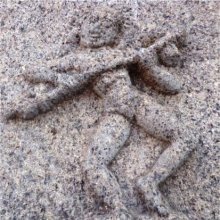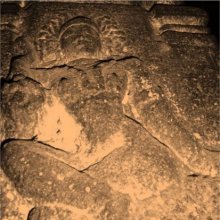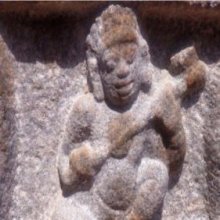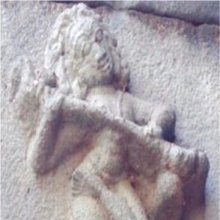Ekatara, Eka-tara, Ekatārā: 12 definitions
Introduction:
Ekatara means something in Hinduism, Sanskrit, Marathi. If you want to know the exact meaning, history, etymology or English translation of this term then check out the descriptions on this page. Add your comment or reference to a book if you want to contribute to this summary article.
Images (photo gallery)
In Hinduism
Shaivism (Shaiva philosophy)
Source: eScholarship: Gāruḍa Medicine (śaivism)Ekatarā (एकतरा) is the name of a Goddess capable of destroying snakes and has Garuḍa as one of her three faces, according to the pañcaviṃśatihṛdayācakra chapter of the Jayadrathayāmala. An alternative Ekatarā goddess is described in the fourth division of the text, this one having four faces, but similarly associated with mastery of snakes.

Shaiva (शैव, śaiva) or Shaivism (śaivism) represents a tradition of Hinduism worshiping Shiva as the supreme being. Closely related to Shaktism, Shaiva literature includes a range of scriptures, including Tantras, while the root of this tradition may be traced back to the ancient Vedas.
Jyotisha (astronomy and astrology)
Source: Wisdom Library: Brihat Samhita by VarahamihiraEkatārā (एकतारा) refers to “those Ketus having a single disc”, according to the Bṛhatsaṃhitā (chapter 11), an encyclopedic Sanskrit work written by Varāhamihira mainly focusing on the science of ancient Indian astronomy astronomy (Jyotiṣa).—Accordingly, “The comets which are white, of single disc [i.e., sita-ekatārā], without tails and glossy are named Vikacā Ketus and are the sons of Jupiter [i.e., gurusuta]. They are 65 in number; they appear in the south and when they appear mankind will not be happy. The comets that are neither very bright nor clearly visible to the naked eye, and that are long and white are named Taskara Ketus; they are the sons of Mercury, they appear anywhere and are 51 in number; when they appear mankind will feel miserable”.

Jyotisha (ज्योतिष, jyotiṣa or jyotish) refers to ‘astronomy’ or “Vedic astrology” and represents the fifth of the six Vedangas (additional sciences to be studied along with the Vedas). Jyotisha concerns itself with the study and prediction of the movements of celestial bodies, in order to calculate the auspicious time for rituals and ceremonies.
Languages of India and abroad
Marathi-English dictionary
Source: DDSA: The Molesworth Marathi and English Dictionaryēkatārā (एकतारा).—a Of one chord or string--a musical instrument.
--- OR ---
ēkatārā (एकतारा).—m A monochord. 2 An unrivaled or a peerless star. A term of praise for a person of brilliant performances or powers.
Marathi is an Indo-European language having over 70 million native speakers people in (predominantly) Maharashtra India. Marathi, like many other Indo-Aryan languages, evolved from early forms of Prakrit, which itself is a subset of Sanskrit, one of the most ancient languages of the world.
Sanskrit dictionary
Source: DDSA: The practical Sanskrit-English dictionaryEkatara (एकतर).—(n. °taram)
1) One of two, either; P.VII. 1.26, Vart.
2) Other, different.
3) One of many.
Source: Cologne Digital Sanskrit Dictionaries: Shabda-Sagara Sanskrit-English DictionaryEkatara (एकतर).—mfn.
(-raḥ-rā-raṃ) 1. Either, one of two. 2. Other, different. E. eka and ḍatarac affix of the comparative.
Source: Cologne Digital Sanskrit Dictionaries: Benfey Sanskrit-English DictionaryEkatara (एकतर).—[eka + tara], adj., f. rā, n. ram, One of two, [Rāmāyaṇa] 6, 6, 12.
Source: Cologne Digital Sanskrit Dictionaries: Cappeller Sanskrit-English DictionaryEkatara (एकतर).—[adjective] one of two.
Source: Cologne Digital Sanskrit Dictionaries: Monier-Williams Sanskrit-English Dictionary1) Ekatara (एकतर):—[=eka-tara] [from eka] mfn. (n. am, not at by [vArttika] on [Pāṇini 7-1, 26]) one of two, either, other, [Mahābhārata; Pañcatantra] etc.
2) [v.s. ...] (rarely) one of many, [Dāy.; Kādambarī]
Source: Cologne Digital Sanskrit Dictionaries: Yates Sanskrit-English DictionaryEkatara (एकतर):—[eka-tara] (raḥ-rā-raṃ) a. Either; other.
[Sanskrit to German]
Sanskrit, also spelled संस्कृतम् (saṃskṛtam), is an ancient language of India commonly seen as the grandmother of the Indo-European language family (even English!). Closely allied with Prakrit and Pali, Sanskrit is more exhaustive in both grammar and terms and has the most extensive collection of literature in the world, greatly surpassing its sister-languages Greek and Latin.
Kannada-English dictionary
Source: Alar: Kannada-English corpusĒkatāra (ಏಕತಾರ):—[noun] a single-stringed instrument, usu. used for base pitch for singing.
Kannada is a Dravidian language (as opposed to the Indo-European language family) mainly spoken in the southwestern region of India.
See also (Relevant definitions)
Starts with: Eka-taraviratan, Ekatarah, Ekataraha, Ekatarai, Ekataramgiya, Ekatarapha, Ekataraphi.
Ends with: Anekatara, Shikekatara, Shikkekatara.
Full-text: Eka-taraviratan, Ekatari, Ekatantri, Ekatare, Ekadari, Sarvanaman, Ekatama, Nava.
Relevant text
Search found 3 books and stories containing Ekatara, Eka-tārā, Ēkatāra, Eka-tara, Ekatārā, Ēka-tāra, Ēkatārā, Ēka-tārā; (plurals include: Ekataras, tārās, Ēkatāras, taras, Ekatārās, tāras, Ēkatārās). You can also click to the full overview containing English textual excerpts. Below are direct links for the most relevant articles:
Brihad Bhagavatamrita (commentary) (by Śrī Śrīmad Bhaktivedānta Nārāyana Gosvāmī Mahārāja)
Verse 2.4.152 < [Chapter 4 - Vaikuṇṭha (the spiritual world)]
Prasthanatrayi Swaminarayan Bhashyam (Study) (by Sadhu Gyanananddas)
4.1. Akṣarabrahman is not Parabrahman < [Chapter 3 - Analysis on the Basis of Metaphysics]
A History of Indian Philosophy Volume 5 (by Surendranath Dasgupta)
Part 2 - The Nature of Brahman < [Chapter XXXVI - Philosophy of Śrīkaṇṭha]



